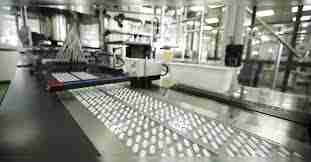The healthcare logistics market has witnessed remarkable growth in recent years, driven by the increasing demand for efficient supply chain solutions in the medical and pharmaceutical sectors. With high stakes involved in the timely delivery of critical healthcare products, competition in this market has intensified, prompting logistics providers to innovate and expand. This competitive landscape is shaped by a mix of global logistics giants and specialized regional firms, each vying for market share through technological advancements, service diversification, and strategic alliances.

Overview of Market Competitiveness
Healthcare logistics is a complex, regulation-driven market where customer trust and operational precision are crucial. The competitive environment is defined by companies offering specialized services such as cold chain logistics, just-in-time inventory systems, pharmaceutical warehousing, and reverse logistics for expired or recalled products. As healthcare delivery becomes increasingly patient-centric and globalized, the demand for seamless and secure logistics has skyrocketed—escalating competition across geographies.
Companies compete not only on cost and service quality but also on their ability to meet regulatory requirements and manage sensitive products under strict temperature and timing conditions. Barriers to entry are moderate due to regulatory hurdles, high infrastructure investment, and the need for established supply networks.
Key Players Dominating the Market
Several multinational logistics companies dominate the healthcare logistics landscape, bringing robust infrastructure and global coverage:
DHL Supply Chain & Global Forwarding
A global leader, DHL offers specialized healthcare logistics services with temperature-controlled shipping and regulatory compliance expertise. Its Life Sciences and Healthcare division operates in over 150 countries, providing integrated supply chain solutions tailored to pharmaceutical and biotech clients.FedEx Corporation
FedEx provides a wide range of services, including temperature-sensitive transportation through its FedEx HealthCare Solutions. With strong last-mile delivery capabilities and investment in sensor-based monitoring, FedEx remains a competitive force, especially in North America.UPS Healthcare
Known for its global cold chain and clinical trial logistics solutions, UPS Healthcare has made significant investments in healthcare distribution centers and temperature-controlled packaging systems. Its 2020 acquisition of Marken enhanced its capabilities in the clinical supply chain segment.SF Express and Nippon Express
These companies are gaining traction in the Asia-Pacific region. SF Express focuses on domestic pharma delivery within China, while Nippon Express offers GDP-certified transport and warehousing solutions across Japan and other Asian markets.Kuehne + Nagel
A European logistics giant, Kuehne + Nagel operates a strong network of GDP-compliant warehouses and offers highly customized logistics for pharmaceutical and biotech firms.
Strategies for Competitive Differentiation
Players in the healthcare logistics market adopt several strategies to stay ahead:
Technology Integration
Leading companies are investing in digital platforms, AI, and IoT to enhance real-time tracking, temperature monitoring, and predictive analytics. Blockchain is also gaining popularity for improving transparency and traceability.Strategic Partnerships and M&A
Collaborations with pharmaceutical companies, biotech startups, and healthcare providers help logistics firms expand their customer base and service offerings. Acquisitions are common to gain access to specialized capabilities or new geographic markets.Regulatory Compliance and Certification
Maintaining Good Distribution Practices (GDP) certification and complying with FDA, EMA, and WHO guidelines is a major differentiator. Firms that proactively adapt to changing regulations often earn long-term contracts with healthcare manufacturers.Cold Chain Specialization
The rise in demand for biologics and vaccines has made cold chain capabilities a vital aspect of competition. Companies that offer end-to-end cold chain solutions, from packaging to delivery, hold a significant advantage.
Regional Competitive Dynamics
While global players dominate in developed markets like North America and Western Europe, regional logistics companies are emerging strong in Asia-Pacific, Latin America, and the Middle East. These local players leverage cost advantages, regulatory familiarity, and local infrastructure knowledge to compete effectively with multinationals.
For instance, in India and Southeast Asia, firms like Blue Dart and Yusen Logistics are expanding their healthcare portfolios to meet growing domestic demand. Meanwhile, African nations are witnessing increasing activity from NGOs and development-focused logistics providers, creating a different competitive environment focused on accessibility and affordability.
Future Outlook of Competitive Landscape
The competitive landscape of the healthcare logistics market is expected to intensify over the next five years due to several trends:
Rising Demand for Home Delivery and ePharmacy Fulfillment
Companies offering last-mile and contactless delivery solutions will see a surge in demand, especially post-COVID-19.Emergence of Specialized Startups
Niche startups offering AI-powered route planning, drone-based deliveries, or ultra-cold chain packaging are challenging incumbents and driving innovation.Sustainability as a Differentiator
With increasing focus on ESG goals, companies offering green logistics—such as electric fleet options, biodegradable packaging, and carbon tracking—are poised to win new contracts.Vertical Integration by Pharma Companies
Some pharmaceutical companies are beginning to internalize logistics operations to improve control and efficiency. This trend may challenge third-party providers and force them to add more value-added services.
Conclusion
The healthcare logistics market is characterized by intense competition, rapid technological evolution, and expanding service demands. Global giants like DHL, FedEx, and UPS are leveraging their infrastructure and expertise, while regional firms and tech-driven startups continue to challenge the status quo. As the industry becomes more integrated with digital health and precision medicine, competitive strategies will increasingly revolve around agility, innovation, and compliance.
Ultimately, companies that combine operational excellence with technological innovation and customer-centric services will continue to lead in this dynamic and critical industry.




